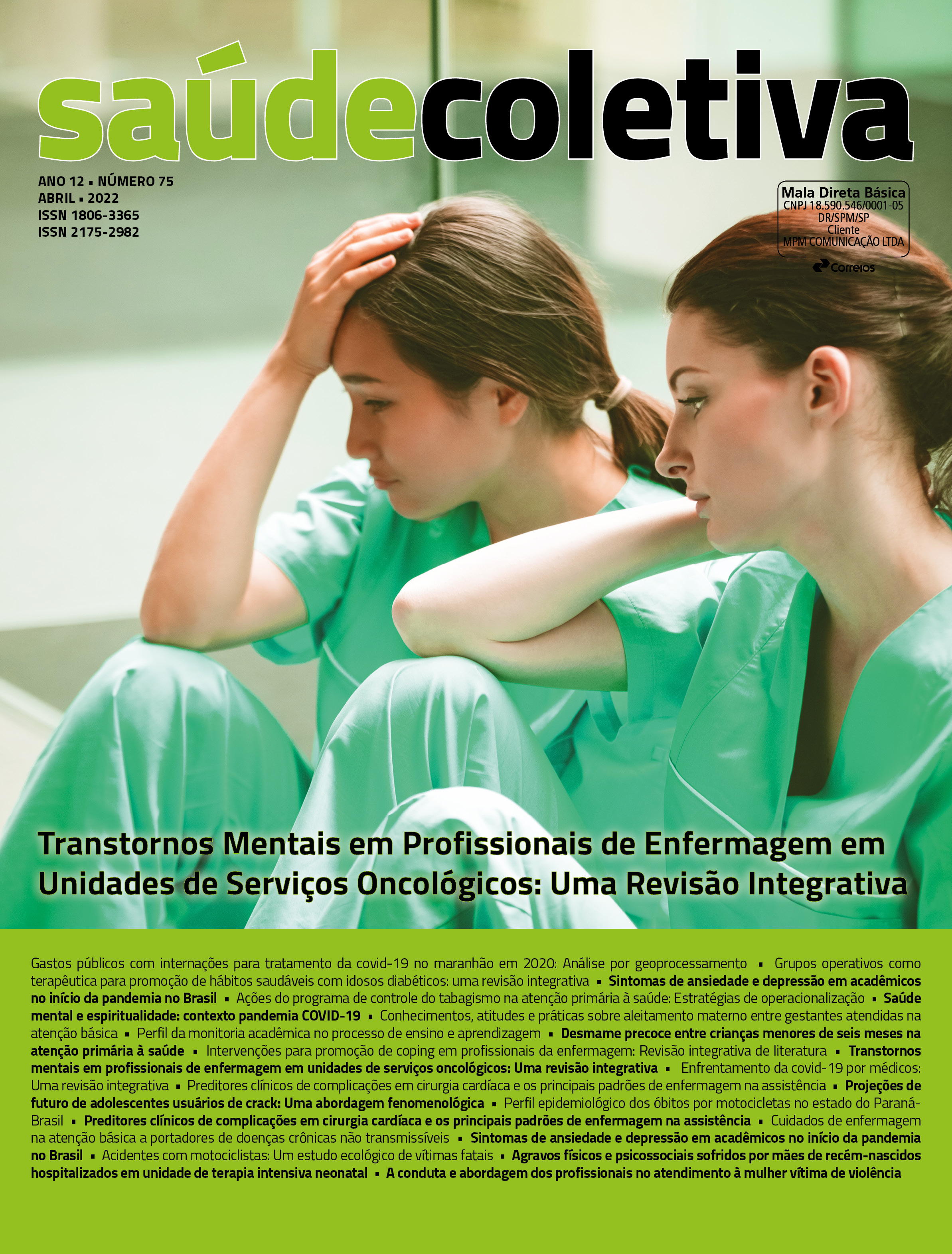Use of educational technologies in the context of diabetes mellitus and the repercussions on self-care: An integrative review
DOI:
https://doi.org/10.36489/saudecoletiva.2022v12i75p10237-10250Keywords:
Health education, Educational technology, Diabetes mellitusAbstract
Objective: to identify in the scientific literature technologies used in the health education process of people with Diabetes Mellitus and the repercussions on self-care. Methods: this is an integrative review with data collection from February to March 2021, through secondary sources: Cumulative Index to Nursing and Allied Health Literature, Medical Literature Analysis and Retrieval System Online, Latin American and Caribbean Literature in Health Sciences and Scientific Electronic Library Online. Results: several technologies are used, such as: cell phone applications, sending a short message service, text messaging, voice or calls, creating web sites, brochures, booklets, educational videos and combined technologies. The repercussions on self-care were the drop in glycated hemoglobin, glycemic control, changes in lifestyle and medication adherence. Conclusion: it is believed that the study will make it possible to expand the knowledge of these existing technologies, with the aim of promoting health and preventing injuries in patients with Diabetes Mellitus.
References
Golbert A, Vasques ACJ, Faria ACRA, Lottenberg AMP, Joaquim AG, Vianna AGD et al. Diretrizes da Sociedade Brasileira de Diabetes: 2019-2020. Editora Cient Clannad; 2019, 1-491.
Rasoul AM, Jalali R, Abdi A, Salari N, Rahimi M, Mohammadi M. The effect of self-management education through weblogs on the quality of life of diabetic patients. BMC Med Inform Decis Mak. 2019, 19(1):1-12.
Rodrigues SC, Schleder Gonçalves L. Tecnologia educacional para pessoas em uso de insulina. Ciência, Cuid e Saúde 2020, 19: 1-12.
Melo IA de, Andrade JS de, Otero LM. Construção e validação de tecnologias educacionais desenvolvidas por enfermeiros para pessoas com Diabetes Mellitus: uma revisão integrativa. Int Nurs Cong. 2017,1-4.
Torres H de C, Pereira FRL, Alexandre LR. Avaliação das ações educativas na promoção do autogerenciamento dos cuidados em diabetes mellitus tipo 2. Rev da Esc Enferm da USP. 2011, 45(5):1077-82.
Tavares De Souza M, Dias da Silva M, De Carvalho R. Revisão integrativa: o que é e como fazer. Einstein. 2010, 8(1):102-6.
Galvão T. Principais itens para relatar Revisões sistemáticas e Meta-análises: A recomendação PRISMA. Epidemiol e Serviços Saúde. 2015, 24(2):335-42.
Lacerda MR, Costenaro RGS. Metodologias da pesquisa para enfermagem e saúde: da teoria à prática. 1ªEdição. Porto Alegre – RS: Moriá, 2016. Cap.2: 51-76.
Kundury KK, Hathur B. Intervention through Short Messaging System (SMS) and phone call alerts reduced HbA1C levels in ~47% type-2 diabetics-results of a pilot study. PLoS One [Internet]. 2020, 15: 1-19. Disponível em: http://dx.doi.org/10.1371/journal.pone.0241830.
Wang X, Liu D, Du M, Hao R, Zheng H, Yan C. The role of text messaging intervention in Inner Mongolia among patients with type 2 diabetes mellitus: a randomized controlled trial. BMC Med Inform Decis Mak. 2020, 20(1):1-11.
Ji H, Chen R, Huang Y, Li W, Shi C, Zhou J. Effect of simulation education and case management on glycemic control in type 2 diabetes. Diabetes Metab Res Rev. 2019, 35(3):1-7.
Boels AM, Vos RC, Dijkhorst-Oei LT, Rutten GEHM. Effectiveness of diabetes self-management education via a smartphone application in insulin treated type 2 diabetes patients - design of a randomised controlled trial ('TRIGGER study'). BMJ Open Diabetes Res Care. 2019, 7(1):1-10.
Al-Ozairi E, Ridge K, Taghadom E, De Zoysa N, Tucker C, Stewart K, et al. Diabetes and TelecommunicationS (DATES) study to support self-management for people with type 2 diabetes: a randomized controlled trial. BMC Public Health. 2018,18(1):1-7.
Dong Y, Wang P, Dai Z, Liu K, Jin Y, Li A, et al. Increased self-care activities and glycemic control rate in relation to health education via Wechat among diabetes patients: A randomized clinical trial. Med (United States). 2018,97(50):1-5.
Heitkemper EM, Mamykina L, Tobin JN, Cassells A, Smaldone A. Baseline Characteristics and Technology Training of Underserved Adults With Type 2 Diabetes in the Mobile Diabetes Detective (MoDD) Randomized Controlled Trial. Diabetes Educ. 2017,43(6):576-88.
Abaza H, Marschollek M. SMS education for the promotion of diabetes self-management in low & middle income countries: a pilot randomized controlled trial in Egypt. BMC Public Health. 2017,17(1):1-19.
Wieland ML, Njeru JW, Hanza MM, Boehm DH, Singh D, Yawn BP, et al. Pilot Feasibility Study of a Digital Storytelling Intervention for Immigrant and Refugee Adults With Diabetes. Diabetes Educ. 2017, 43(4):349-59.
Devchand R, Nicols C, Gallivan JM, Tiktin M, Krause-Steinrauf H, Larkin M, et al. GRADE Research Group. Assessment of a National Diabetes Education Program diabetes management booklet: The GRADE experience. J Am Assoc Nurse Pract. 2017, 29(5):255-63.
Kerfoot BP, Gagnon DR, McMahon GT, Orlander JD, Kurgansky KE, Conlin PR. A Team-Based Online Game Improves Blood Glucose Control in Veterans With Type 2 Diabetes: A Randomized Controlled Trial. Diabetes Care. 2017, 40(9):1218-25.
Booth AO, Lowis C, Hunter SJ, Dean M, Cardwell CR, Mckinley MC. Development and Evaluation of a Computer-Based, Self-Management Tool for People Recently Diagnosed with Type 2 Diabetes. J Diabetes Res. 2016.
Goh G, Tan NC, Malhotra R, Padmanabhan U, Barbier S, Allen JC, et al. Short-term trajectories of use of a caloric-monitoring mobile phone app among patients with type 2 diabetes mellitus in a primary care setting. J Med Internet Res. 2015, 17(2):e33.
Aikens JE, Rosland AM, Piette JD. Improvements in illness self-management and psychological distress associated with telemonitoring support for adults with diabetes. Prim Care Diabetes. 2015, 9(2):127-34.
Jennings CA, Vandelanotte C, Caperchione CM, Mummery WK. Effectiveness of a web-based physical activity intervention for adults with Type 2 diabetes-a randomised controlled trial. Prev Med (Baltim) [Internet]. 2014, 60:33-40. Disponível em: http://dx.doi.org/10.1016/j.ypmed.2013.12.011.
Kirwan M, Vandelanotte C, Fenning A, Duncan MJ. Diabetes self-management smartphone application for adults with type 1 diabetes: randomized controlled trial. J Med Internet Res. 2013, 15(11):1-15.
Williams ED,Bird D, Forber AW, Russell A, Ash S, Friedman R, et al. Randomised controlled trial of an automated, interactive telephone intervention (TLC Diabetes) to improve type 2 diabetes management: baseline findings and six-month outcomes. BMC Public Health [Internet]. 2012, 12(1):1.
Mcllhenny CV, Guzic BL, Jnee DR, Demuth BR, Roberts JB. Using technology to deliver healthcare education to rural patients. Rural Remote Health. 2011, 11(4):1-11.
Quinn CC, Shardell Md, Terrin ML, Barr EA, Ballew SH, Gruber-Baldini AL. Cluster-randomized trial of a mobile phone personalized behavioral intervention for blood glucose control. Diabetes Care. 2011, 34(9):1934-42.
Dick JJ, Nundy S, Solomon MC, Bispo KN, Chin MH, Peek ME. Feasibility and usability of a text message-based program for diabetes self-management in an urban African-American population. J Diabetes Sci Technol. 2011, 5(5):1246-54.
Galdino YLS, Moreira TMM, Marques ADB, Silva FAA da. Validation of a booklet on self-care with the diabetic foot. Rev Bras Enferm. 2019,72(3):780-7.
Tibes CM dos S, Dias JD, Zem-Mascarenhas SH. Aplicativos móveis desenvolvidos para a área da saúde no Brasil: revisão integrativa da literatura. Rev Min Enferm. 2014,18(2):471-8.
Greenwood DA, Gee PM, Fatkin KJ, Peeples M. A Systematic Review of Reviews Evaluating Technology-Enabled Diabetes Self-Management Education and Support. J Diabetes Sci Technol. 2017,11(5):1015-27.
Ribeiro ÉF de AALT, Melo IVOS de PMC, Abreu Vj de, Dutra ÉT de SNLMA, Queiroz CC. Elaboração de tecnologia educacional sobre educação em saúde para crianças com diabetes mellitus tipo I. Enferm Foco. 2020, 11(6):185-91.
Owolabi EO, Goon D Ter, Ajayi AI. Impact of mobile phone text messaging intervention on adherence among patients with diabetes in a rural setting: A ransomized controlled trial. Med (United States). 2020, 99(12).
Souza JV de, Ferreira MA, Andrade JIA de, Calixto AVD, Lira RC de. Tecnologias educacionais desenvolvidas para o cuidado ao paciente diabético: revisão integrativa da literatura. Rev Eletrônica Acervo Saúde. 2021, 13(5):e7014.
Oliveira GYM de, Almeida AM de O, Araújo Girão AL, Aires de Freitas CH. Intervenções de enfermagem para promoção do autocuidado de pessoas com diabetes tipo 2: revisão integrativa. Rev Eletrônica Enferm. 2016, 18:1-12.
Nunes YT, Vicente MC, Leite RBSM, Simões JC, Xavier BHSH, Manola CCV, Melo EBM. Construção de tecnologia educativa para o controle de infecção em serviços de saúde. Saúde Coletiva (Barueri). 2020; 55 (10): 2869-2875







